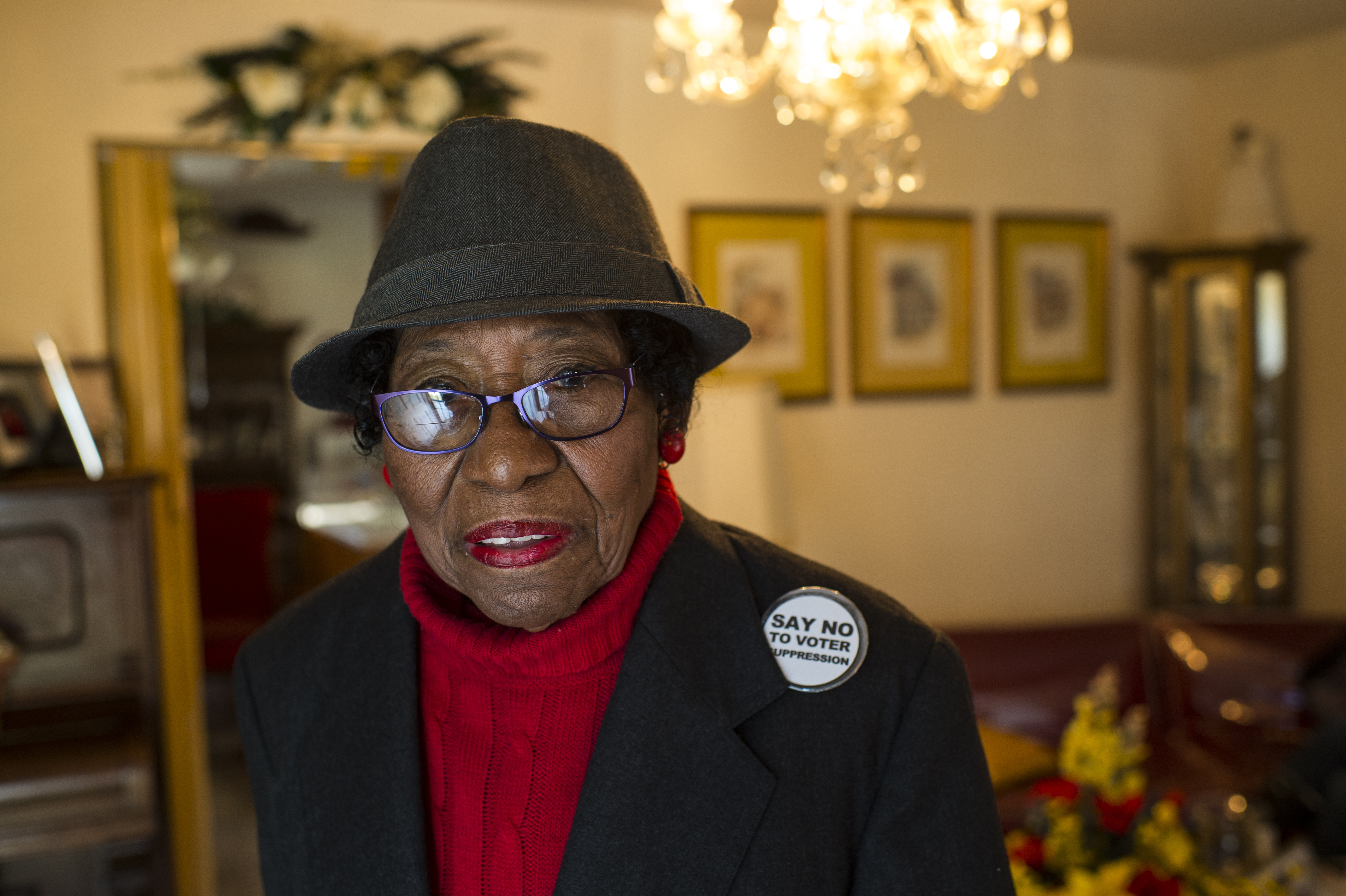Court: North Carolina Voter ID Law Targeted Black Voters

Rosanell Eaton, 94, didn't have a qualifying ID to vote after North Carolina's law passed. She joined a suit against it. (Nikki Kahn/The Washington Post via Getty Images)
A federal appeals court panel struck down North Carolina’s voter ID law on Friday, overturning what’s considered the broadest piece of restrictive voting legislation passed in recent years.
This is the second voter ID law to be overturned in as many weeks, while another was weakened. A separate federal appeals court struck down Texas’ last Wednesday, ruling that it discriminated against black and Latino voters by presenting an undue burden to accessing the ballot. A day earlier, a federal judge curbed Wisconsin’s voter ID law, allowing voters who don’t have identification to cast a ballot if they swear to their identity.
North Carolina’s bill extended beyond requiring a state-issued photo ID at the polls. The law cut early voting days and banned same-day voter registration, eliminated straight-ticket voting, which allows voters to choose all candidates from a single party by checking one box; and introduced more restrictions on casting provisional ballots. It prohibited pre-registration for 16- and 17-year-olds, who previously were allowed to indicate their intent to vote when applying for a driver’s license. The law also allowed for more poll watchers and made it easier to challenge voters or their ballots.
On Friday, a three judge panel of the United States Court of Appeals in Richmond, Va. found the law not only had a discriminatory effect, but that lawmakers did so on purpose.
Discrimination with “almost surgical precision”
In North Carolina, African-Americans vote overwhelmingly for Democrats. They came out to vote in record numbers in 2008 and 2012 for President Barack Obama, and helped to turn the traditionally Republican-leaning state into a swing state. North Carolina went to Obama in 2008, and was narrowly won by Mitt Romney in 2012.
In 2013, in Shelby v. Holder, the U.S. Supreme Court overturned a section of the Voting Rights Act that required North Carolina and other states with a history of voter discrimination to submit any voting-law changes to the federal government for approval.
A day after the Shelby decision, Republican lawmakers in North Carolina announced plans for an election law that, the federal appeals court has since found, restricted voting and registration in several ways, “all of which disproportionately affected African Americans.”
The court said that in crafting the law, the Republican-controlled general assembly requested and received data on voters’ use of various voting practices by race. It found that African American voters in North Carolina are more likely to vote early, use same-day voter registration and straight-ticket voting. They were also disproportionately less likely to have an ID, more likely to cast a provisional ballot and take advantage of pre-registration.
Then, the court, said, lawmakers restricted all of these voting options, and further narrowed the list of acceptable voter IDs. “… [W]ith race data in hand, the legislature amended the bill to exclude many of the alternative photo IDs used by African Americans. As amended, the bill retained only the kinds of IDs that white North Carolinians were more likely to possess.”
The state offered little justification for the law, the court said. Those who defended the law said they were doing so to prevent voter fraud. “Although the new provisions target African Americans with almost surgical precision, they constitute inapt remedies for the problems assertedly justifying them and, in fact, impose cures for problems that did not exist,” the court said.
It added: “We can only conclude that the North Carolina General Assembly enacted the challenged provisions of the law with discriminatory intent.”
Although it struck down the law, the court stopped short of recommending that North Carolina be pulled back under the Voting Rights Act’s pre-clearance requirement.
“What the panel lays out is just the plainest reading of what transpired here, which is that the legislature sought to target African-American voters to further entrench themselves in the legislature,” said Chris Brooks, the legal director of North Carolina’s American Civil Liberties Union. “That is the chronology of what transpired here. That’s the only reasonable interpretation of what transpired here.”
The North Carolina attorney general’s office didn’t immediately comment on the ruling.
With three months until Election Day, the state could still seek a hearing from the full appeals court or the U.S. Supreme Court, although that’s less likely since it currently only has eight justices. For now, North Carolina’s election law no longer stands.





